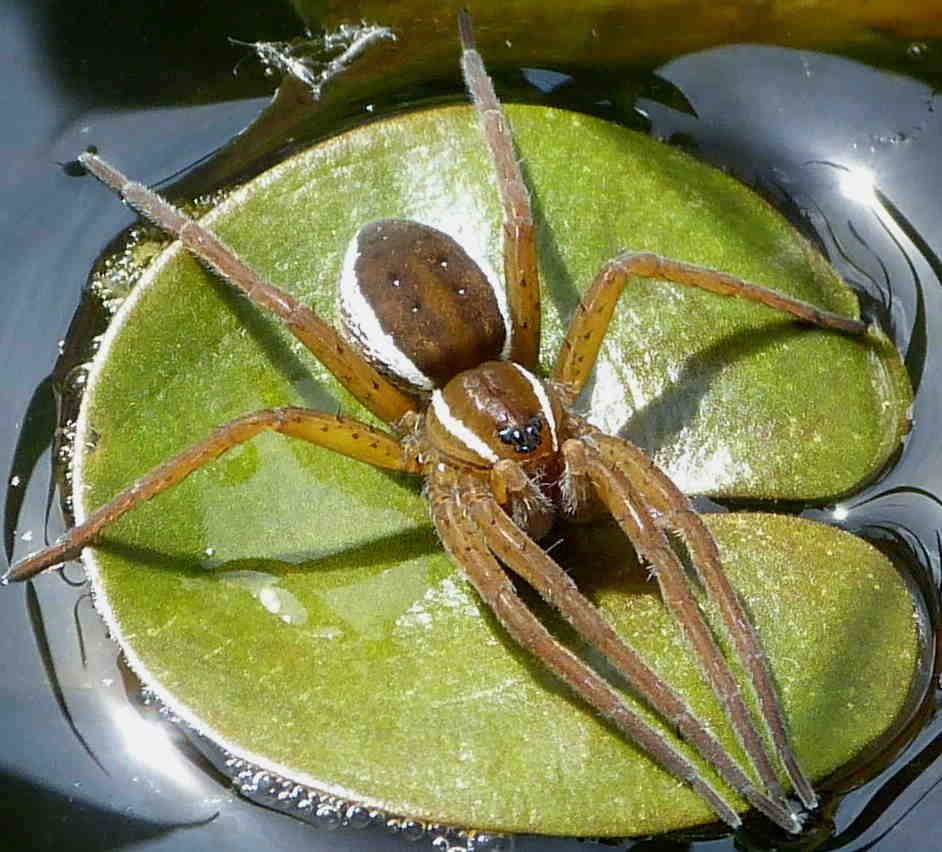Hands-on involvement in raft spider conservation
There are many ways in which you can contribute to the ongoing work to understand and conserve both Dolomedes plantarius and its very localised and Nationally Scarce congener, D. fimbriatus in the UK. These include:
Submitting records
Remnant natural populations of D. plantarius are well known at three UK sites but it is still possible that other populations remain undiscovered. It is also possible, although unlikely, that some Dolomedes populations currently assumed to be D. fimbriatus are in fact D. plantarius. We are also aware that the distribution of D. fimbriatus, particularly in upland Britain, is incompletely mapped, and that records for known sites are often out-of-date. Records from well-known localities as important as those for newly discovered sites.
If you know of populations of D. fimbriatus in your locality and are unsure whether they are formally recorded or their identity has been verified, please either submit your record (the location (comprising a postcode or 6-figure grid reference), your name, the date of the sighting and a photograph) directly to the national Spider Recording Scheme or contact me for identification advice or more information. Please send with details of the location and habitat and, if possible, photographs of the spiders. Gaining a complete picture of the current status of both Dolomedes species in the UK is a key element in future efforts to safeguard their populations. Records for known populations are just as important as those for new sites.
Helping with monitoring and site management
If you live near any of the D. plantarius sites in East Anglia, or near Swansea in South Wales, volunteers are often needed to help to monitor the populations and to undertake other practical management tasks to help maintain important wetland habitats. The conservation organisations that manage the reserves offer training to new volunteers and organise spider monitoring schedules as well as a very varied programme of conservation work parties. Please contact me if you would like to be put in touch with reserve staff to discuss how you can help.
Involvement with recording and conservation of other arachnids
In Britain 16% of our approximately 670 spider species are considered to be at risk of extinction (Harvey et al. 2017). Many other species appear to be declining in abundance. It is vital the recording of spiders and other arachnids is increased to better quantify population trends and to start to understand the drivers of decline. New species arrive in Britain at an increasing rate and some species are rapidly expanding their ranges, apparently in response to climate change. Among arachnids, the impacts of these species on our native fauna are entirely unquantified.
For all of these reasons, becoming involved in recording arachnids can make an important contribution to our understanding of their populations and, for rarer species, our ability to conserve them. The British Arachnological Society (BAS), Britain's only charity devoted exclusively to the study and understanding of arachnids (spiders, harvestmen and pseudoscorpions) runs the national Spider and Harvestman Recording Schemes and promotes the Pseudoscorpion Recording Scheme. To find out more about the BAS, please visit its website at www.britishspiders.org.uk and follow it on Twitter @britishspiders.
